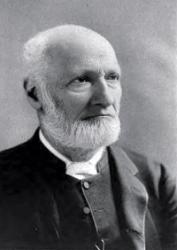Planning worship?
Check out our sister site, ZeteoSearch.org,
for 20+ additional resources related to your search.
- |
User Links
Search Results
An dem Tag der Zornesflammen
Author: Thomas of Celano Appears in 7 hymnals
An dem Tag der Zornesflammen
An dem Tag der Zornesflammen
Author: Thomas of Celano Hymnal: Deutsches Gesangbuch #484 (1859) Languages: German
An dem Tag der Zornesflammen
An dem Tag der Zornesflammen
Author: Thomas of Celano Hymnal: Deutsches Gesangbuch #484 (1893) Topics: Auferstehung und Weltgericht Languages: German
An dem Tag der Zornesflammen
An dem Tag der Zornesflammen
Author: Philip Schaff; Thomas of Celano Hymnal: Evangelisches Gesangbuch #518 (1862) Languages: German
An dem Tag der Zornesflammen
Thomas of Celano
1200 - 1265 Author of "An dem Tag der Zornesflammen" in Deutsches Gesangbuch Thomas of Celano was born at Celano in the Abruzzi, and joined St. Francis of Assisi c. 1214. He was commissioned by Gregory IX to write the life of St. Francis: the First Legend, 1229; the Second Legend, 1247; and the Tract on the Miracle of St. Francis a few years later. His Legend of St. Clare was composed in 1255. He was probably among the first band of friars to visit Germany, 1221.
--The Hymnal 1940 Companion
===============================
Thomas of Celano. It is somewhat remarkable that neither the date of the birth nor of the death of this writer, whose name is so intimately associated with the Dies Irae, is on record. He was a native of Celano, a small town near the lake Fucino, in the farther Abruzzo, and hence his name of Thomas of Celano. Several of the inhabitants of this town were driven therefrom by Frederick II. in 1223, and Thomas with the rest. He found his way to Assisi, and became a monk there during the lifetime of St. Francis. The Franciscan Order was established in 1208, Thomas was therefore one of the early students at Assisi. He was subsequently "custos of the convents of Worms, Mentz, and Cologne, and afterwards sole custos of the Rhine districts." The last named appointment he held till 1230, when he returned to Assisi. As intimated above the date of his death is not on record. It is sometimes given as 1255. Thomas also wrote a Life of St. Francis.
--John Julian, Dictionary of Hymnology, Appendix I (1907)
See also in:
Hymn Writers of the Church
Thomas of Celano
Philip Schaff

1819 - 1893 Author of "An dem Tag der Zornesflammen" in Evangelisches Gesangbuch Schaff, Philip, D.D., LL.D., was born at Chur, Switzerland, Jan. 1, 1819. He studied at the Universities of Tübingen, Halle, and Berlin. In 1843 he was appointed a Professor in the German Reformed Theological Seminary at Mercersburg, Pennsylvania, U.S.A., and in 1870 Professor of Sacred Literature in the Union Seminary, New York. As translator, author, and editor, Dr. Schaff holds high rank, both in Great Britain and America. The various Histories and Encyclopedias which he has edited are standard works. His knowledge of hymnology is extensive, and embraces hymns in many languages and of all ages, his speciality being German hymnody. The hymnological works which he has edited alone, or jointly with others, are:—
(1) Deutsches Gesangbuch, 1860; (2) Christ in Song, a most valuable collection of original English and American hymns, and translated hymns, N.Y. 1869, London, 1870; (3) Hymns and Songs of Praise for Public and Social Worship, 1874, in which he was assisted by Boswell D. Hitchcock, and Zachary Eddy; (4) Library of Religious Poetry, 1881, of which A. Gilman was joint editor.
Dr. Schaff has not composed any original hymns. His translations from the Latin are meritorious. He died Oct. 20, 1893.
--John Julian, Dictionary of Hymnology (1907)
Philip Schaff


 My Starred Hymns
My Starred Hymns


